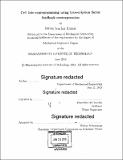| dc.contributor.advisor | Domitilla Del Vecchio. | en_US |
| dc.contributor.author | Kumar, Nithin Senthur | en_US |
| dc.contributor.other | Massachusetts Institute of Technology. Department of Mechanical Engineering. | en_US |
| dc.date.accessioned | 2018-11-28T15:43:55Z | |
| dc.date.available | 2018-11-28T15:43:55Z | |
| dc.date.copyright | 2018 | en_US |
| dc.date.issued | 2018 | en_US |
| dc.identifier.uri | http://hdl.handle.net/1721.1/119340 | |
| dc.description | Thesis: M. Eng., Massachusetts Institute of Technology, Department of Mechanical Engineering, 2018. | en_US |
| dc.description | Cataloged from PDF version of thesis. | en_US |
| dc.description | Includes bibliographical references (pages 63-67). | en_US |
| dc.description.abstract | Recent advances in stem cell research has demonstrated that the fate of a terminally differentiated cell can be reverted back to pluripotency. The ability to reprogram a differentiated cell back to its undifferentiated, pluripotent state would be a significant breakthrough for regenerative medicine. For example, lost or damaged cells could be replaced by patient-specific reprogrammed cells, thus providing on-demand, compatible, high-quality cells of any required type. However, current protocols for reprogramming rely on simplified models that do not wholly capture system dynamics and on inefficient transcription factor overexpression. We study a gene regulatory network that determines the cell fate in the hematopoietic lineage and demonstrate that a deterministic model cannot capture the experimentally observed system dynamics. We also propose the use of feedback control to address inefficient reprogramming and implement two configurations of the controller on both deterministic and stochastic models of the Oct4-Nanog network. We also address practical issues such as placement of the regulator and consider the effect of inducing or constitutively producing microRNA on the protein steady-state distribution. | en_US |
| dc.description.statementofresponsibility | by Nithin Senthur Kumar. | en_US |
| dc.format.extent | 67 pages | en_US |
| dc.language.iso | eng | en_US |
| dc.publisher | Massachusetts Institute of Technology | en_US |
| dc.rights | MIT theses are protected by copyright. They may be viewed, downloaded, or printed from this source but further reproduction or distribution in any format is prohibited without written permission. | en_US |
| dc.rights.uri | http://dspace.mit.edu/handle/1721.1/7582 | en_US |
| dc.subject | Mechanical Engineering. | en_US |
| dc.title | Cell fate reprogramming using transcription factor feedback overexpression | en_US |
| dc.type | Thesis | en_US |
| dc.description.degree | M. Eng. | en_US |
| dc.contributor.department | Massachusetts Institute of Technology. Department of Mechanical Engineering | |
| dc.identifier.oclc | 1065526129 | en_US |
